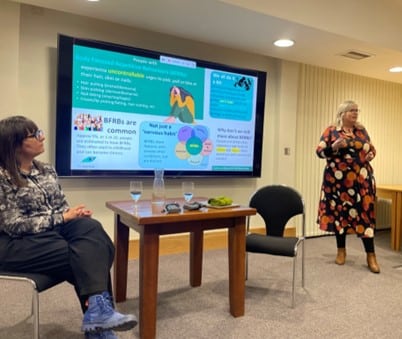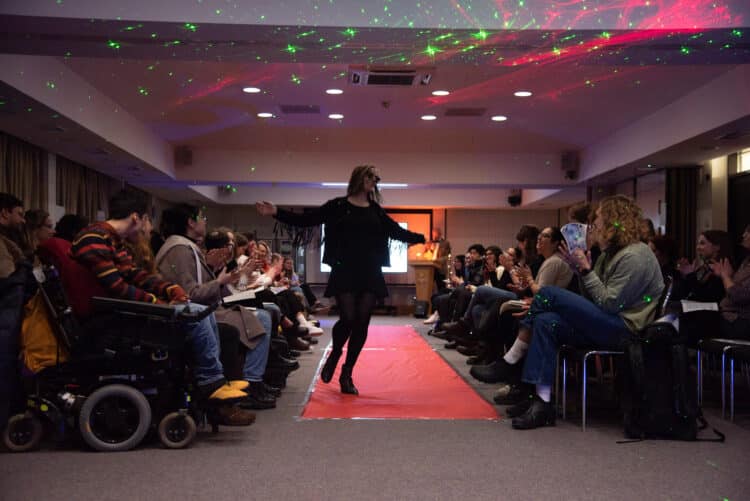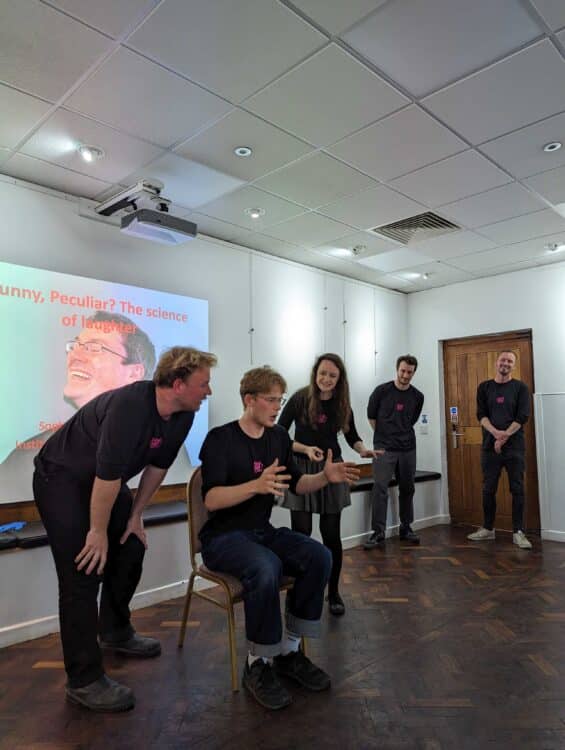Centre for the Creative Brain
The Centre for the Creative Brain: thinking about neuroscience in a wider context
The Centre for the Creative Brain at St Edmund Hall brings together people from a wide range of disciplines and provides an opportunity for discussion and dialogue. In particular, it aims to explore how neuroscience can further our understanding of the aspects of our lives that make us most human, and how insights from art, music, and literature can enrich our understanding of the brain.
Anyone with an interest is welcome to attend the Centre’s events, which are always free of charge and aimed at a non-specialist audience. We particularly encourage members and associate members of all three common rooms (JCR, MCR and SCR) within the College, non-academic staff, former students, and friends of the Hall to become involved.
The Origins of Inspiration
Talks by two neuroscientists and an author, exploring this most nebulous, and yet perhaps most important, of creative moments, given at an event in November 2018.
Creative Sparks, Artists with Epilepsy – Dr Rhys Thomas (Newcastle University)
This talk was given in May 2018 as part of an evening event on ‘The Art (and Science) of Epilepsy’.
Shakespeare and the Brain
The Centre for the Creative Brain hosted this event on Saturday 26 November 2016 at St Edmund Hall. The symposium explored the theme of 'Shakespeare and the Brain' from the perspective of neuroscientists, literature scholars, and thespians. All five talks were aimed at a non-specialist audience and form a fascinating series.
The Use of Point-Light Displays to Study the Perception of Biological Motion - Dr Anthony Atkinson (Durham University)
Dr Anthony Atkinson (who is an alumnus of St Edmund Hall – 1993, DPhil in Psychology) delivered this talk as part of a 2017 Centre for the Creative Brain symposium entitled ‘Is Seeing Believing?’.
Humans and animals move in ways that inanimate objects do not. Research shows that human observers are not only highly attuned to such biological motion but are also able to infer a range of characteristics about other people primarily or solely on the basis of the way they move. In this talk, Dr Atkinson provides an overview of this research, which has come from many labs around the world, including his own.
Detective Stories: Inside the Criminal Mind – 11 March 2021
This event explored the criminal mind through psychology, psychiatry and literature. Through the lens of crime writing, psychology and forensic psychiatry, the Centre explored what drives people to commit crime, the makeup of a criminal mind and why we are so fascinated by it.
The Mystery of Hypnosis – how suggestible is your brain? - 26 November 2020
The Centre presented an evening focused on hypnosis and suggestibility. What makes people suggestible? How does hypnosis work? Why do we find it entertaining? The workshop explored the theory, science and practicalities of hypnosis and was attended by over 170 people.
Centre for the Creative Brain: Music and the Brain – 31 May 2020
The Centre organised its first ever online seminar “Music and the Brain – a Story of Immersion”. This wonderful series of talks attracted over 170 attendees, who learnt more about how the brain reacted when we were listening to music and how that might vary between a live performance and listening to a recording.
Synesthesia: tasting words & seeing sounds – 1 February 2020
St Edmund Hall hosted an afternoon lecture series on ‘Sense and Synesthesia’ to explore this extraordinary sensory stimulation. the event brought together a wide ranging insight into synesthesia in children and adults, the different forms of the condition and how it influences creative professions. The Hall also welcomed special guest James Wannerton, president of the UK Synesthesia Association.
The Neuroscience of Hollywood – 29 November 2019
This event was a lecture exploring the myth: “Is it true that we only use 10% of our brain?” given by Professor Heidi Johansen-Berg and Dr Malte Kaller but hosted by Professor Charlotte Stagg who heads the Centre’s activities. The talk unpicked the myth delving into the questions of what evidence is behind the claim, how film has perpetuated the idea of unlocking brain potential and how the brain already optimises its power to enhance our abilities.
The Benefits of Boredom – 23 May 2019
For the Benefits of Boredom, we had three guest speakers. Dr Sandi Mann from the University of Central Lancashire explained why boredom was an important emotion, enabling our creative thinking. Then Leland Carlson, the Founder of the Dull Men’s Club, gave a talk about the joy that came from appreciating everyday things and some of the eccentricities of the Club’s members. Dr. Helen Barron from the University of Oxford very kindly accepted our invitation to give a talk on how memories are stored in the brain and how they are retrieved.
The Neuroscience of Dance – 23 February 2019
This symposium was opened by Dr Guido Orgs (Senior Lecturer in Psychology at Goldsmiths, University of London) who spoke about the brain mechanisms behind movement perception. Dr Karen Wood and Rosamaria Cisneros, from Coventry University’s Centre for Dance Research (CDaRE), started the next session by teaching the audience the basics of Flamenco, before explaining their research on dancing with avatars. The final talk was delivered by Peter Lovatt of the University of Hertfordshire, who is also known as Dr Dance. He discussed his research into how participation in dance improves the symptoms of Parkinson’s disease. The event concluded with some structured improvisation of combined dance by Aneyn O’Grady and percussion by Lewis Hunt Onatra. Read more.
The Origins of Inspiration – 23 November 2018
We welcomed three very entertaining and informative speakers: two neuroscientists and an author, who drew on their own diverse experiences to share some fascinating perspectives and insights into the topic. Linda Davies, a successful writer of both financial thrillers and young adult fiction, explained how she came to write her first novel (after getting angry with her boss!) and how she has found inspiration for her subsequent books. Dr Robin Carhart-Harris shared some thoughts on his research into the effects of psychedelic drugs, and Professor Paul Matthews responded to both of the preceding talks and discussed the combination of hard work and preparation that he believes is also fundamental in order for those rarer moments of inspiration to strike. Read more and watch the talks online.
The Art (and Science) of Epilepsy – 18 May 2018
This evening event explored the link between epilepsy and art in many forms. It featured talks from Dr Sallie Baxendale, on how epilepsy has inspired filmmakers over the last 100 years; Dr Rhys Thomas, discussing artists with epilepsy (watch video); and Dr Rhys Bevan-Jones, on his work in art and mental health.
The Importance of Telling Stories – 24 February 2018
This symposium explored how the brain encodes information through stories and narrative, what makes a good story, and how this can be harnessed to allow more effective communication. The afternoon closed with a workshop, hosted by Simon De Deney of Infinite Space, to allow attendees to practise creating their own stories.
Is Seeing Believing? With Stephen Mottram’s Animata – 25 November 2017
An exploration of how our brain creates perception of the world around us, and how this understanding can be exploited to create art, theatre and even magic. This symposium featured talks from Matthew Tompkins, a psychologist and magician investigating how sleight of hand experiments can teach us about perception; Dr Anthony Atkinson, a psychologist studying how emotions can be inferred from limited visual information; Dr Betina Ip, a vision neuroscientist with a background in fine art; and Stephen Mottram, who also closed the afternoon with a performance of his Animata show, which uses only white-tipped wands to create a funny, mesmerising story about youth and old age. Watch a video of Dr Anthony Atkinson’s talk here.
Explaining Consciousness – 12 May 2017
A talk by Professor Paul Skokowski, Executive Director at the Centre for the Explanation of Consciousness and Consulting Professor of Symbolic Systems at Stanford University, and Visiting Fellow at St Edmund Hall. A related paper has now been published which describes many of the same ideas in greater depth. The paper is free to read and is available here.
The Weather and our Emotions – 4 March 2017
This event explored the link between the weather and our emotions from the perspective of artists, neuroscientists and literature scholars, with talks from Donna Han, an award-winning artist; Dr Erin Lafford, whose work looks at atmospherics in 18th- and 19th-century literature; and Dr Alexander Kaltenboeck, who studies neuro-cognitive models of mood disorders.
Shakespeare and the Brain – 26 November 2016
This symposium explored the theme of Shakespeare and the Brain from the perspective of neuroscientists, literature scholars, and thespians. Podcasts of all the talks are available in the Videos tab on this page.
Perceiving Presence: Theatre, Liveness and the Brain – 14 May 2016
Theatre has long been explored as a medium defined by its ‘liveness’. At its core the theatre event is a process of encounter between performer, space and audience. In this talk Campbell Edinborough (lecturer in the School of Drama, Music and Screen at the University of Hull) discussed how different paradigms of human interiority have shaped the terms of this encounter, outlining some of ways in which developments in the fields of neuroscience and psychology can be seen to have influenced the aesthetics of theatrical representation. Campbell also outlined how more recent insights from the field of neuroscience might be used by performers to develop practical skills for engaging with theatre as a live event, and spoke about how his approach to making theatre has been shaped by his interest in how the brain coordinates action, focusing particularly on his work with the Feldenkrais Method and martial arts.
Virtual Biopsy: Magnetic Resonance Spectroscopy and Brain Surgery – 8 March 2016
Part of a series of satellite events on neuroscience imaging methods, Uzay Emir of FMRIB and neurosurgeon Nick de Pennington spoke about magnetic resonance spectroscopy, a technique that probes the chemical make-up of the brain without piercing the skin, and its current and future applications.
The Myths and Reality of Healthy Ageing – Dr Claire Sexton of the Oxford Centre for Functional MRI of the Brain (FMRIB) – 3 March 2016
“Old age isn’t so bad when you consider the alternative.” Maurice Chevalier
How does the Hollywood depiction of ageing, where cosmetic wrinkles and a loss of memory and abilities are portrayed as the norm, match with our experience of this most common of processes? Can neuroscience start to help us to understand both healthy ageing and that most feared condition, dementia, which currently affects 850,000 people in the UK? In this talk, Dr Claire Sexton discussed how charity-led initiatives like Dementia Friends translate research findings to raise awareness about dementia within our communities, the latest research findings examining links between physical activity and ageing, and how, going forward, community initiatives can inform research practice.
Get to Know the Human Connectome – 2 December 2015
This was the first in a new satellite series on Neuroscience Imaging Methods. Anderson Winkler and Saad Jbabdi, both of FMRIB (Oxford Centre for Functional MRI of the Brain), spoke about the Human Connectome Project (HCP). The HCP is a large, NIH-funded initiative that is mapping brain connections in more than a thousand individuals using state-of-the-art methods.
Creativity in Art: A Neuronal Hypothesis – Prof. J-P Changeux, Collège de France (in collaboration with the Maison Francaise) – 24 October 2015
Jean-Pierre Changeux is one of France’s most distinguished neuroscientists and was a PhD Student of Jacques Monod and Monod’s colleague, Francois Jacob, with whom he shared a Nobel prize. Changeux developed a novel model for the way neurons communicate that was a precursor of Edelman’s ‘neural Darwinism’ theory. He is a Professor in the Collège de France, served for many years as Chair of the French government’s art heritage committee and is a noted collector of French painting of the 18th century. He has become a well-known commentator on artistic creativity and its brain origins.
Professor Changeux’s seminar was followed by a round-table discussion with Jason Gaiger (Associate Professor, Contemporary Art History and Theory & Fellow of St Edmund Hall), Morten Kringelbach (Professor of Neuroscience, Aarhus University & Senior Research Fellow, University of Oxford) and Andrew Parker (Professor of Physiology, University of Oxford).
Laughter and the Brain – 15 May 2015
We all like to laugh, and stand-up comedy is becoming increasingly big business. But why and how do we laugh? Does it serve an evolutionary purpose? This event was an evening of presentations and discussion on humour aimed at non-scientists and scientists alike, marking the end of the first successful year for the Centre for the Creative Brain. The speakers were Professor Sophie Scott (Deputy Director of the Institute of Cognitive Neuroscience at UCL), Professor Gordon Claridge (Emeritus Professor of Abnormal Psychology at Oxford University), Mr Paul Mayhew-Archer (prolific producer and script writer for radio and television comedy), Dr Brett Mills (Senior Lecturer in the School of Art, Media and American Studies at UEA) and Dr Hisham Ziauddeen (a psychiatrist with a research interest in the neuroscience behind food addiction, who also performs stand-up comedy).
Memory and the Mind – Dr David Dupret (St Edmund Hall) – 12 March 2015
The idea that every event in our lives leaves a distinct memory trace in the brain – and indeed that these traces can be written and re-written at will – is something that has fascinated film-makers for many years. The possibility of mplanting some-one else’s memories, or erasing memories we no longer wish to have, have captured the imagination of directors and audiences alike. In this evening talk, David Dupret, a Fellow of St Edmund Hall, debunked the myths and spoke about his most recent work – suggesting that, in certain circumstances at least, the science fiction of Hollywood may not be that far from the truth.
Music and the Mind – 15 November 2014
The inaugural symposium of the Centre for the Creative Brain. Download the programme for the day here.
For all who were interested in Prof. Paul Skokowski’s talk in Trinity term 2017, we are delighted to announce that a related paper has been published which describes many of the same ideas in greater depth. The paper is free to read and is available online.
Temperature, Color and the Brain: An Externalist Reply to the Knowledge Argument
If you would like to join our mailing list, please send a blank email to seh_ccb-subscribe@maillist.ox.ac.uk.
You can also follow us on X!
If you have any queries about the Centre for the Creative Brain, please email centreforthecreativebrain@gmail.com.
St Edmund Hall has an increasing reputation as a centre for world-leading neuroscience, across the full breadth of the discipline. The Centre benefits from the active involvement of many of these Fellows, as well as many others, at St Edmund Hall. We also have strong support from the wider neuroimaging community in Oxford, including The Wellcome Centre for Integrative Neuroimaging (WIN) – a multi-disciplinary neuroimaging research facility which encompasses the Oxford Centre for Functional MRI of the Brain (FMRIB), Oxford Centre for Human Brain Activity (OHBA, Department of Psychiatry) and imaging facilities within the Department of Experimental Psychology.
The Centre is grateful for the generous financial support for its activities provided by William R. Miller (alumnus and Honorary Fellow of St Edmund Hall) and the Wellcome Centre for Integrative Neuroimaging.
We have a cross-common-room, interdisciplinary committee which steers the activities of the Centre. The committee for 2020-21 is:
Rosalind McDonald-Hill (Chair)
Ms. Camille Lasbareilles (Secretary): DPhil student in Clinical Neurosciences, St Edmund Hall.
Dr. Ioana Grigoras (Secretary): DPhil student in Clinical Neurosciences, St John’s College.
Mr. Gabriel Ocana-Santero (Secretary): DPhil in Pharmacology, St John’s College.
Prof. Heidi Johansen-Berg: Director of the Wellcome Centre for Integrative Neuroimaging, Professor of Cognitive Neuroscience, and Wellcome Principal Research Fellow - St Edmund Hall.
Prof. Robert Wilkins: Associate Professor of Epithelial Physiology - St Edmund Hall.
Prof. David Dupret: MRC Investigator at the Brain Network Dynamics Unit (BNDU) - St Edmund Hall.
Prof. Paul Matthews: Head of Brain Sciences at Imperial College and SCR Fellow by Special Election at St Edmund Hall.
News from the Centre for the Creative Brain

Retrospective: Four Inspiring Journeys into the Brain at Oxford’s Centre for the Creative Brain
5 Nov 2025

